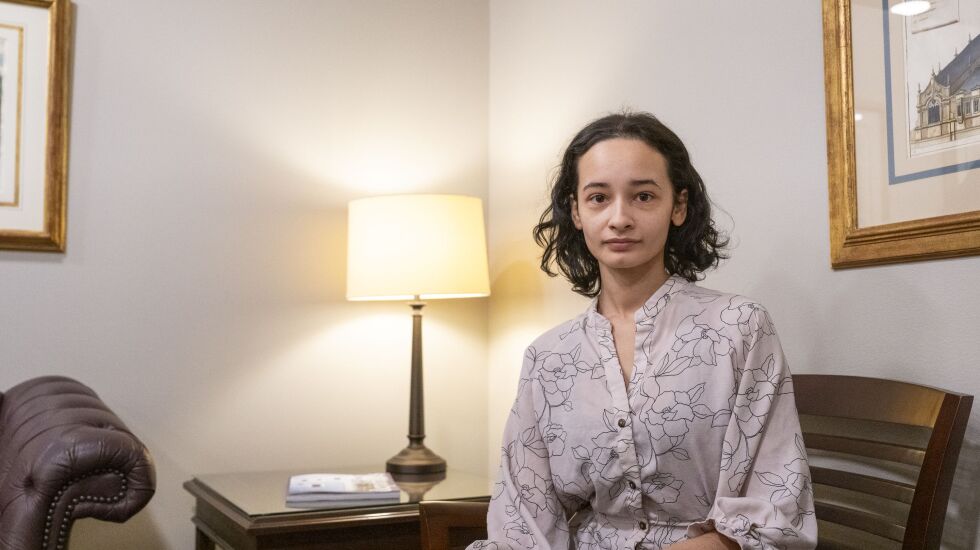
Nidalis Burgos said she used to commute an hour and 20 minutes each way on public transportation to get from her home in Humboldt Park to Loyola University Chicago.
She graduated from Lincoln Park High School in 2016. She commuted to school to save money on her education, but withdrew from Loyola after two years.
Burgos, who was a first-generation, low-income student, completed an associate’s degree at Harold Washington College.
Struggling to graduate on time or at all from a four-year university is not an uncommon experience for Chicago Public Schools graduates.
A new study from the University of Chicago’s To&Through Project showed just 30% of CPS graduates at bachelor’s degree-granting universities received their degrees in four years. The six-year graduation rate was more than 20 percentage points higher at 51%.
Although both those rates have increased in the past decade — even as the number of college enrollees from CPS doubled to nearly 9,000 in that time — they are significantly less than the national four- and six-year graduation rates, the study says.
The study, titled “The Four Years Fallacy,” is scheduled to be released Tuesday. The study used data from students who graduated from CPS in 2014 and immediately went on to four-year universities.
The study says 90% of students nationally expect to finish college in four years. Jenny Nagaoka, one of the authors of the study and the deputy director of the UChicago Consortium on School Research, said calling bachelor’s-granting institutions “four-year universities” is a “misnomer” for many students.
Disparity in grad rates exists among CPS grads at all types of schools
This disparity exists at selective enrollment high schools, too, the study shows. Some selective enrollment schools have six-year college completion rates 30 percentage points higher than their four-year graduation rates.
Tanvi Kapatral said she considered herself a strong student at Whitney M. Young Magnet High School. She said it was “jarring” when she began to struggle academically during her freshman year at the University of Illinois. The university placed Kapatral on academic probation and ultimately asked her to leave.

Kapatral moved home to Chicago and took classes at Roosevelt University. She was later able to return to Illinois, and she graduated with a degree in psychology in August 2022, one term later than she had initially planned to graduate.
The study cited extra tuition costs and delayed entry into the workforce as challenges students face when they do not graduate in the expected four years. Nagaoka added that graduating late can take a “psychological toll.”
Kapatral said she “felt a lot of shame” about her path in college. She added that it was frustrating to feel like her first year was “a waste,” especially considering how much tuition cost.
Cassie Creswell, executive director of the advocacy group Illinois Families for Public Schools, says she is concerned about the financial burden of extra semesters of college, especially for low-income families. Creswell said pursuing a bachelor’s degree is “not necessarily a great economic investment for everyone.”
Burgos said she felt in high school she was pushed toward attending a four-year university. She said this was not necessarily the best choice for her, given her family’s financial situation.
Though certain factors — like higher test scores and GPAs — affect students’ graduation rates, the gap between four- and six-year graduation rates persists across demographics. These differentials ranged from 15% to 25%, the study reported.
Even though students who scored a 24 or higher on the ACT have a better chance of graduating with a bachelor’s degree than students with lower scores, there is still a difference of 22 percentage points between those students’ four- and six-year graduation rates.
Black male students need more support, author says
Black male students have the lowest four- and six-year graduation rates, the study found. Just 13% of Black male CPS graduates completed bachelor’s degrees in four years. Alexandra Usher, a co-author of the study, said this was particularly concerning to the research team. Usher said CPS should offer greater support for Black male students to remedy this disparity.
Nagaoka said it is also up to colleges to provide resources and support for students to graduate on the expected timeline. These resources could include better academic advising and nontuition financial support like emergency loans or free use of textbooks.
College search tools that provide information about schools to prospective students should also include both four- and six-year graduation rates, Nagaoka said.
Advanced Placement courses key to getting out on time
One way to speed things up is by taking Advanced Placement courses in high school, which give students a chance to earn college credit before they enroll in college.
Daniel Pitzele, a sophomore at the University of Maryland, will likely complete his degree in four years or less with the AP credits he earned at Whitney Young, his parents said.
His brother Adrian, a senior at Whitney Young who is applying to colleges now, said he was confident he would also be able to graduate from college in four years or less. He said he was “encouraged” by the school to take AP classes.
“We are extremely lucky,” Monika Pitzele said of the opportunities her sons have had in high school.







